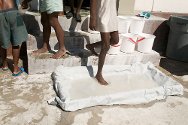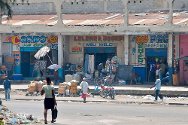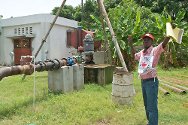Haiti: ICRC steps up work to fight cholera
26-11-2010 Operational Update
The cholera epidemic continues to spread to an alarming extent in 10 departments of Haiti. According to the latest estimates by the Ministry of Public Health and Population, 25,000 persons have come down with the disease and over 1,400 have died. Numerous humanitarian organizations are involved in the struggle to combat it.
Some areas are more prone to cholera than others: poor neighbourhoods in Port-au-Prince, for example, where overcrowding and poor hygiene facilitate its spread. Another example is prisons. Out of a total of 18 prisons (holding 5,500 persons), six facilities (3,500 detainees) are affected. They are Cap Haïtien, Mirebalais, Saint Marc and Hinche (both north of the capital), Les Cayes (south of the capital) and the civilian prison in Port-au-Prince. In all, 174 detainees have so far been treated for cholera; 22 of them have died.
ICRC response
The ICRC delegation in Haiti has just been reinforced by the arrival of four nurses, a doctor and two water-and-sanitation engineers.
In Cité Soleil, Martissant and other impoverished neighbourhoods of Port-au-Prince, the ICRC is working together with the Haitian National Red Cross Society to facilitate access to clean water and to take sick people to hospital. It is also taking part in hygiene-awareness campaigns.
But the ICRC is concentrating particularly on places of detention, in which it remains one of the few humanitarian organizations present.
The organization is coordinating its activities with the rest of the International Red Cross and Red Crescent Movement and all others involved.
Confronting cholera in places of detention
Since the epidemic erupted, the ICRC has been striving to enable the authorities to take preventive measures in all prisons. To this end it is working closely with the national prison service, the Ministry of Justice and Public Security, the national police, the United Nations Stabilization Mission in Haiti, and various UN agencies and non-governmental organizations.
- Hygiene measures have been taken in 11 places of detention. These consist among other things in cleaning and disinfecting cells and latrines, chlorinating water, and holding awareness-raising sessions for staff and detainees about hygiene and cholera. The ICRC has also distributed hygiene items such as soap and cleaning materials.
- On the advice of the medical department of the prison service, over 3,500 detainees in the facilities affected are receiving a preventive dose of doxicycline, an antibiotic used to treat cholera. In addition, prison dispensaries are being regularly supplied with medicines, oral rehydration salts and IV drips.
- In conjunction with medical staff at Port-au-Prince central prison, the ICRC has set up a cholera-treatment centre within the facility. It consists of four observation and treatment stations. Staff from the ICRC and the Japanese Red Cross Society are present daily.
Assisting residents of poor areas
In impoverished neighbourhoods, the ICRC is cooperating with the national agency for water supply and treatment, its partners from the International Red Cross and Red Crescent Movement, and a number of NGOs.
- To expedite the process of taking sick people to hospital, the ICRC is actively supporting the Haitian Red Cross by providing Red Cross staff with vehicles, protective equipment and first-aid material. Since the epidemic started, the Red Cross has taken over 300 sick people to hospital.
- Assisted by the ICRC, Haitian Red Cross volunteers give residents information about cholera and impress on them the importance of being extra-strict about hygiene. So far they have held information sessions for over 3,000 people.
- In the neighbourhood of Cité Soleil, the ICRC is stepping up the process of disinfecting the water-supply network. In addition, water-purification tablets are being distributed to people using tapstands repaired by the ICRC.




